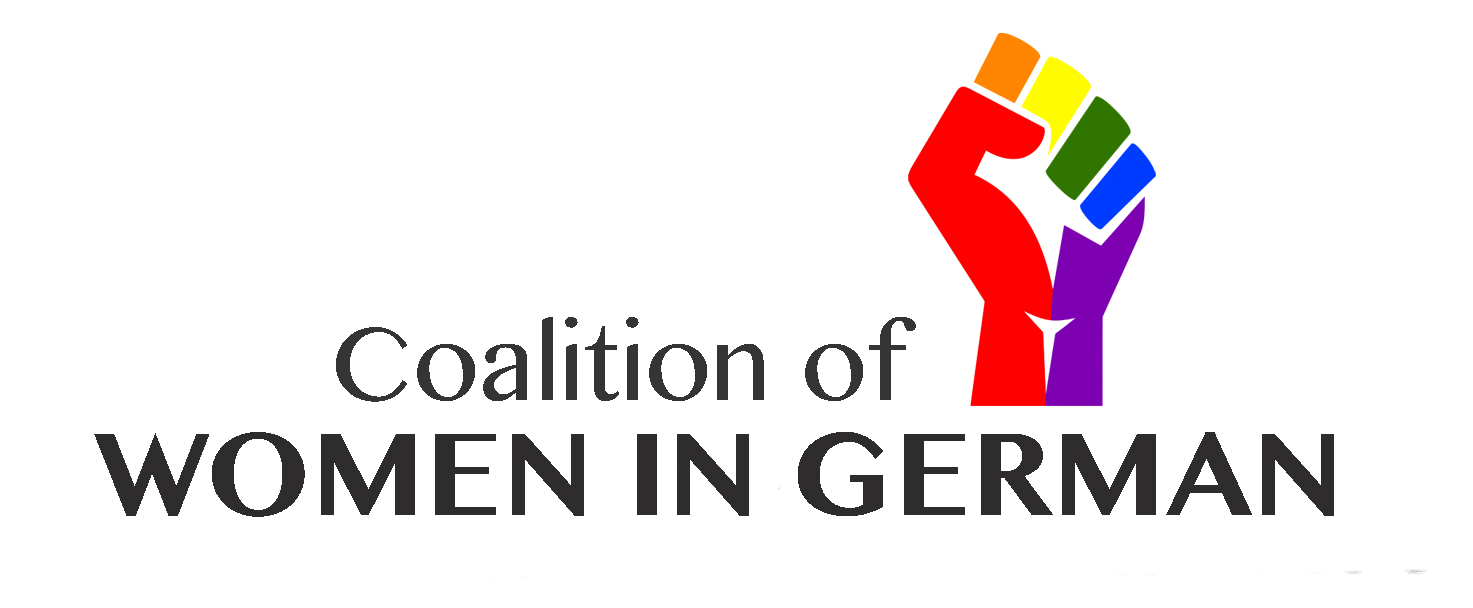Feminist German Studies (formerly Women in German Yearbook) is a refereed publication presenting a wide range of intersectional feminist approaches to all aspects of German literature, culture, and language, including pedagogy. Reflecting the interdisciplinary perspectives that inform feminist German studies, each issue contains critical inquiries employing gender and other analytical categories to examine the work, history, life, literature, and arts of the German-speaking world.
Feminist German Studies publishes two issues per year. The regular issue appears in Fall/Winter and a guest-edited special issue appears in Spring/Summer.
Book reviews are published in the Fall/Winter regular issue. (See additional information below.)
To access the journal visit: https://muse.jhu.edu/journal/403
Note: Volumes prior to 2018 were published under the title Women in German Yearbook and book reviews were published in the WiG newsletter.
Submissions: We accept article submissions at any time. The deadline to be considered for the regular issue is November 30; guest editors will include deadlines for special issue submissions in the call for papers.
Please send regular issue article submissions to the editors via e-mail (fgs@womeningerman.org) formatted according to the style guide linked below.
We also accept proposals for special issue topics and editorship on a rolling basis. Calls for special issue topics and co-editors will be distributed as needed via the WiG email list. To submit a proposal for a special issue, e-mail the editors at fgs@womeningerman.org
NOTE: We currently have accepted proposals for the next two special issues (40.1 and 41.1). New proposals will be considered for issue 42.1 (spring/summer 2026).
For questions about article submissions or special issue guest-editorship, please e-mail the editors at fgs@womeningerman.org
Book Reviews: Book reviews are published in the regular Fall/Winter issue of the journal each year. Calls for books to review and for reviewers will be shared via the WiG email list.
For questions about book reviews and book submissions for review, e-mail the book review editor at bookreviews@womeningerman.org
Style Guidelines: Feminist German Studies follows the MLA Handbook, 9th edition, with some exceptions. For details, please see the style guide.
 |
Feminist German Studies Volume 39, Number 2, Fall/Winter 2023
|
To access the issue, visit the following link: https://muse.jhu.edu/issue/51130
Please link to Project Muse when assigning these articles – every click supports Women in German!
Note: Volumes prior to 2018 were published under the title Women in German Yearbook.
Volume 39, 2023
Volume 38, 2022
- Volume 38, Number 2, Fall/Winter 2022
- Volume 38, Number 1, Spring/Summer 2022 special issue “The Singular Plural of Feminist Film Practice”
Volume 37, 2021
- Volume 37, Number 2, Fall/Winter 2021
- Volume 37, Number 1, Spring/Summer 2021 special issue “Performing Resistance”
Volume 36, 2020
- Volume 36, Number 2, Fall/Winter 2020
- Volume 36, Number 1, Spring/Summer 2020 special issue “Collaboration in the Humanities”
Volume 35, 2019
Volume 34, 2018
Volume 33, 2017
Volume 32, 2016
Volume 31, 2015
Volume 30, 2014
Volume 29, 2013
Volume 28, 2012
Volume 27, 2011
Volume 26, 2010
Volume 25, 2009
Volume 24, 2008
Volume 23, 2007
Volume 22, 2006
Volume 21, 2005
Volume 20, 2004
Volume 19, 2003
Volume 18, 2002
Volume 17, 2001
Volume 16, 2000
Volume 15, 2000
Volume 14, 1999
Volume 13, 1997
Volume 12, 1996
Volume 11, 1995
Volume 10, 1995
Volume 9, 1994
Volume 8, 1993
Volume 7, 1991
Volume 6, 1991
Volume 5, 1989
Volume 4, 1988
Volume 3, 1986
Volume 2, 1986
Volume 1, 1985
Co-Editors
fgs@womeningerman.org
Beverly Weber, University of Colorado Boulder, 2021 – present
Sara E Jackson, University of Massachusetts Amherst, 2022 – present
Editorial Assistants
Elisa Riga, Ph.D. Candidate, University of Colorado Boulder, 2021 – present
Alex Koch, M.A. Student, University of Colorado Boulder, 2023 – present
Book Review Editor
bookreviews@womeningerman.org
Nicole Grewling, Washington College, 2015 – present
Past Editors:
Alexandra M. Stewart, 2018 – 2023
Hester Baer, 2019-2022
Waltraud Maierhofer, 2016-2018
Carrie Smith, 2015-2017
Elizabeth Ametsbichler, 2012-2015
Margarete Lamb-Pfaffelberger, 2012-2014
Patricia Simpson, 2009-2011
Katharina Gerstenberger, 2008-2010
Maggie McCarthy, 2006-2008
Helga Kraft, 2004-2007
Marjorie Gelus, 2003-2005
Ruth-Ellen Boetcher Joeres, 2002–2004
Patricia Herminghouse, 1994–2002
Susanne Zantop, 1998–2001
Sara Friedrichsmeyer, 1990–1998
Helen Cafferty, 1988–1990
Jeanette Clausen, 1987–1994
Edith Waldstein, 1984–1987
Marianne Burkhard, 1984–1988
Editorial Board Members:
Erwin Malakaj, University of British Columbia Vancouver, 2022-2024
Kyle Frackman, University of British Columbia, 2018-2020, 2021-2023
Lisabeth Hock, Wayne State University, 2020-2022
Michelle James, Brigham Young University, 2018-2020, 2021-2023
Emily Jeremiah, Royal Holloway University of London, 2021-2023
Jill Suzanne Smith, Bowdoin College, 2021-2023
Faye Stewart, University of North Carolina Greensboro, 2021-2023
Kerry Wallach, Gettysburg College, 2020-2022
Past Editorial Board Members:
Margarete Lamb-Faffelberger, Lafayette College, 2015-2018, 2019-2021
Waltraud Maierhofer, University of Iowa, 2019-2021
Beverly Weber, University of Colorado, 2019-2021
Sonja Klocke, University of Wisconsin-Madison, 2018-2020
Ruth-Ellen Boetcher Joeres, University of Minnesota, 2004-2012, 2014-2017, 2018-2020
Carrie Smith, University of Alberta, 2018-2020
Barbara Kosta, University of Arizona, 2001-2004, 2013-2016, 2017-2019
Elizabeth Ametsbichler, University of Montana, 2016-2018
Angelica Fenner, University of Toronto, 2016–2018
Rick McCormick, University of Minnesota, 2011-2018
Tanja Nusser, University of Cincinnati, 2010-2018; Universität Bielefeld, 2004-2010
Patricia Simpson, Montana State University 2016-2018; University of Nebraska 2012-2015
Katharina Gerstenberger, University of Utah, 2010-2017; University of Cincinatti, 2004-2007
Maggie McCarthy, Davidson College, 2008-2016
Kristie Foell, Bowling Green State University, 2012-2015
Caroline Schaumann, Emory University, 2009-2015
Birgit Tautz, Bowdoin College, 2009-2015
Helga Kraft, University of Illinois at Chicago, 2007-2015
Monika Shafi, University of Delaware, 2006-2015
Lora Wildenthal, Rice University, 2004-2015
Patricia Herminghouse, University of Rochester, 2002-2015
Catriona MacLeod,University of Pennsylvania, 2009–2012
Elizabeth R. Mittman, Michigan State University, 2004-2011
Leslie Morris, University of Minnesota, 2004-2011
Friederike Eigler, Georgetown University, 2004-2010
Marjorie Gelus, California State University, 2006-2009
Dagmar Lorenz, University of Illinois Chicago, 2006-2009
Julia Hell, University of Michigan, 2004-2007
Claudia Breger, Indiana University, 2001-2004; Universität Paderborn 2001
Attina Grossman, Cooper Union, 2001-2004
Ruth P. Dawson, University of Hawai’i at Manoa, 2001-2004
Katherine P. Goodman, Brown University, 2001-2004
Georgina Paul, University of Warwick, 2001-2004
Myra Marx Ferree, University of Wisconsin, 2001-2004
Katherine R. Goodman, Brown University, 2001-2004
Atina J. Grossmann, Cooper Union, 2001-2004
Ruth Klüger, University of California, Irvine, 2001-2004
Georgina Paul, University of Warwick, 2001-2004
Sara Friedrichsmeyer, University of Cincinnati, 1999-2004
Jeanette Clausen, Indiana University-Purdue University Fort Wayne, 1995-2004
Gisela Brinker-Gabler, SUNY Binghampton, 1992-2003
Helen R. Cafferty, Bowdoin College, 1992-2003
Susan Cocalis, University of Massachusetts Amherst, 1992-2003
Nancy Kaiser, University of Wisconsin Madison, 1998-2003
Jeannine Blackwell, University of Kentucky, 1992-2003
Renate Mohrmann, Universität zu Köln, 1998-2003
Arlene Teraoka, University of Minnesota, Minneapolis, 1995-2002
Ricarda Schmidt, University of Manchester, England, 1992-2000
Leslie A. Adelson, Cornell University, 1992-2000
Angelika Bammer, Emory University, 1992-2000
Barbara Becker-Cantarino, Ohio State University, 1992-2000
Sara Lennox, University of Massachusetts, Amherst, 1992-2000
Inge Stephan, Humboldt-Universitat zu Berlin, 1995-2000
Susanne Zantop, Dartmouth College, 1995-1998
Gisela Ecker, Universität-Gesamthochschule-Paderborn, 1992-1997
Anna K. Kuhn, University of California Davis, 1992-1997
Elke Frederiksen, University of Maryland, College Park,1992-1994
Edith Waldstein, Wartburg College, 1992-1994

